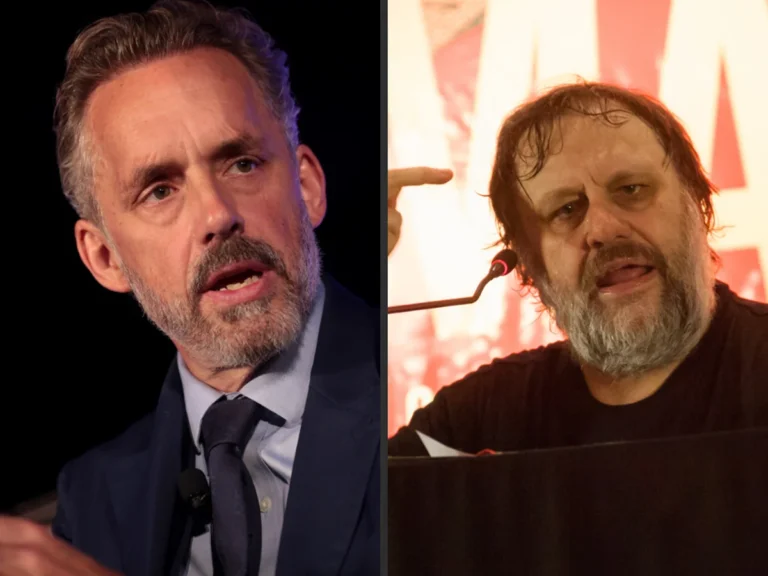Jordan Peterson and Slavoj Zizek are two of the most influential thinkers of the 21st century. Peterson, a Canadian clinical psychologist and professor of psychology, has garnered global fame for his controversial views on political correctness, postmodernism, and cultural Marxism. Zizek, a Slovenian philosopher and cultural critic, is known for his provocative ideas on politics, ideology, and global capitalism. In this article, we’ll explore the key ideas and differences between these two intellectual giants, focusing on the much-anticipated 2019 debate, “Jordan Peterson vs Zizek: Happiness, Capitalism, and Marxism.”

Background
Jordan Peterson rose to prominence through his opposition to Canada’s C-16 bill, which aimed to add gender identity and expression to the list of prohibited grounds for discrimination. He gained a massive following on YouTube, where he regularly posts lectures and interviews on various topics, such as psychology, religion, and politics. His best-selling book, “12 Rules for Life: An Antidote to Chaos,” offers practical advice for personal development and self-improvement.
Slavoj Zizek, on the other hand, has long been a prominent figure in the world of academia, particularly in the fields of psychoanalysis, political theory, and cultural studies. His numerous books and essays, including “The Sublime Object of Ideology” and “Living in the End Times,” challenge conventional wisdom and provoke critical thinking on various subjects, from the nature of ideology to the global political landscape.
The Debate: Jordan Peterson vs Zizek
On April 19, 2019, Jordan Peterson and Slavoj Zizek faced off in a sold-out debate at the Sony Centre in Toronto. The debate was dubbed “Happiness, Capitalism, and Marxism” and was eagerly anticipated by fans and critics alike. The primary focus of the debate was to discuss the merits and drawbacks of capitalism and Marxism, but it also touched on broader issues, such as religion, individualism, and the role of the state in society.
Peterson's Critique of Marxism and Postmodernism
Jordan Peterson has long criticized Marxism and postmodernism, arguing that both ideologies undermine Western civilization and lead to chaos and tyranny. In the debate, Peterson contended that Marxism’s focus on class struggle and economic determinism ultimately results in the oppression of individual rights and liberties. He pointed to the historical failures of communist regimes as evidence of the dangers of Marxism.
Moreover, Peterson argued that postmodernism, with its emphasis on relativism and deconstruction, erodes the very foundations of rational thought and moral values. He posited that this philosophical approach leads to an excessive focus on power dynamics and identity politics, which in turn fosters division and resentment in society.
Zizek's Defense of Marxism and Critique of Capitalism
Slavoj Zizek, a self-proclaimed “radical leftist,” offered a more nuanced view of Marxism during the debate. While acknowledging the atrocities committed in the name of communism, Zizek argued that Marxism as a theoretical framework still has value in understanding and critiquing contemporary society. He contended that capitalism, with its inherent focus on profit and expansion, is unsustainable and has led to global inequality, environmental degradation, and cultural homogenization.
Furthermore, Zizek criticized Peterson’s characterization of postmodernism,
arguing that it is an oversimplification to equate the entire movement with moral relativism and nihilism. Instead, he maintained that postmodernism can be a useful tool for analyzing the complexities and contradictions within modern society.
Zizek also challenged Peterson’s emphasis on individualism, suggesting that it can lead to a disregard for collective responsibilities and social justice. He advocated for a more balanced approach that recognizes the interdependence between individuals and society, as well as the need for collective action to address pressing global issues.
Religion and the Role of the State
The debate between Jordan Peterson and Slavoj Zizek also touched on the role of religion and the state in society. Peterson, who has often defended Judeo-Christian values as essential to Western civilization, argued that these principles provide a foundation for individual rights and responsibilities. He posited that the decline of religious belief has contributed to a sense of meaninglessness and despair in modern society.
Zizek, an atheist, countered that religious beliefs can be both liberating and oppressive, depending on the context. He emphasized the importance of secularism and the separation of church and state, while also acknowledging the cultural and historical significance of religion. Additionally, Zizek argued for the need to address the root causes of social issues, rather than relying on religious dogma or state intervention as a panacea.
Conclusion
The Jordan Peterson vs Zizek debate offered a rare opportunity for the public to witness a clash of ideas between two of the most prominent intellectuals of our time. While their views on politics, religion, and society differ significantly, both thinkers share a common desire to provoke critical thinking and challenge the status quo.
Ultimately, the debate served as a reminder of the importance of engaging in open and honest intellectual discussions, even when we disagree. As society grapples with complex issues such as climate change, wealth inequality, and the rise of divisive ideologies, the ideas and perspectives of thinkers like Jordan Peterson and Slavoj Zizek can help to broaden our understanding and contribute to the ongoing search for solutions.
In conclusion, the Jordan Peterson vs Zizek debate is a testament to the value of intellectual engagement, challenging our assumptions and sparking important conversations on some of the most pressing issues of our time. By exploring the contrasting views of these two influential thinkers, we can gain a deeper understanding of the complexities of politics, religion, and society, and ultimately work toward a more informed and inclusive future.
